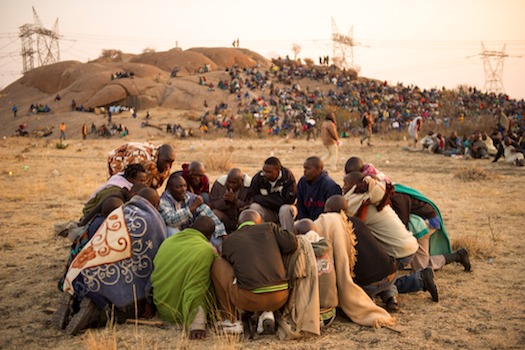- About
- Topics
- Picks
- Audio
- Story
- In-Depth
- Opinion
- News
- Donate
- Signup for our newsletterOur Editors' Best Picks.Send
Read, Debate: Engage.
| October 18, 2016 | |
|---|---|
| topic: | Economic Inclusion |
| tags: | #ANC, #Democratic Alliance (DA), #Expropriation Bill, #Jacob Zuma, #land bill, #South Africa |
| located: | South Africa |
| by: | Shasha Seakamela |
Today, most of South Africa's most fertile land is still in the hands of a few thousand white commercial farmers. Land activists had argued that the pace of land reform was slow and biased, while legal experts were scratching their heads about how some proposed reforms would be implemented.
The approved bill that has been in the works since 2008 still needs to be signed off by the president, Jacob Zuma. The bill aims to speed up the process and will enable the state to pay for land at a value determined by a government adjudicator and then expropriate it for the ‘public interest’, ending the willing-buyer, willing-seller approach to land reform. Out of nearly 80,000 land claims submitted during the 1990s, 8,000 still have not been settled due to protracted legal battles.
“The passing of the bill by parliament is historic and heralds a new era of an intensified land distribution programme to bring long-awaited justice to the dispossessed majority of South Africans,” the ANC (African National Congress) said in a statement.
The bill has so far been hailed by the ruling party ANC as a victory for blacks who were dispossessed of their land by white colonists. Critics fear the bill could affect agricultural production at a time when South Africa is recovering from a serious drought, as well as suffering from creakingly slow economic growth and an expected downgrade of its credit-rating to junk status later this year.
Experts say the bill will not signal the kind of often-violent land grabs that took place in neighbouring Zimbabwe, where white-owned farms were seized by the government for redistribution to landless blacks.
The opposition party, Democratic Alliance (DA) had indicated it was not opposed to expropriation for compensation, but it was concerned that assets that could be expropriated were not defined clearly enough and could include pension funds and animals. It also did not guarantee that compensation would cover any outstanding bank loans for the property.
Many people had stated via social media that, through the Expropriation Bill, the weakened ANC was hoping to steal back some of its popularity through votes from the Economic Freedom Fighters (EFF) heading into municipal elections, which were set for August 3rd. They therefore saw the passing of the bill as more of a populist gesture and the last resort to salvage municipal votes.
“The Economic Freedom Fighters (EFF) is the only significant political movement which has a commitment to take back the land without compensation and give it to the people equitably. The EFF is not ashamed of and will never retreat from this commitment because buying illegally-acquired property is a criminal offence and we will never be party to criminal activities,” said EFF leader Julius Malema.
The ultimate contents of this bill will have a great impact on the future appetite of foreign investors in securing land for purposes other than residential properties, such as purchases of land utilised for purposes of renewable energy projects. According to the bill, in the future foreigners will only be allowed to lease land, not own it.
Political power without economic power is a myth. Land is life. Life is land. Food, houses, farms, herbs for medicines, animal pastures, gold, diamonds, platinum and other mineral wealth are not in the sky or air. They are in the land. Land is the principal means of producing all the necessities of life,” said the former President of the Pan Africanist Congress of Azania (PAC) Dr. Motsoko Pheko,
So why should we take the current proposal seriously? It is clear that the ANC government's previous restitution policy of ‘willing buyer, willing seller’, as opposed to the expropriation route, did not yield results. Hence many still believe the ANC will never resolve the land question in South Africa. The current change of heart is mainly to throw dust in the voters’ eyes and silence the opposition to gather more popularity leading up to the 2019 national elections.
By copying the embed code below, you agree to adhere to our republishing guidelines.
